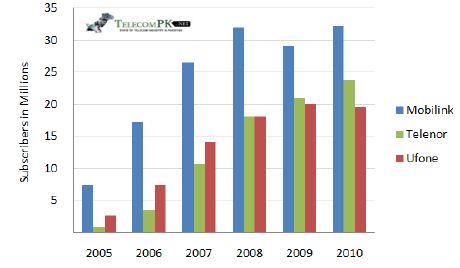Pakistan has now has 100 million mobile phone subscribers.
In a period of a decade Pakistan has gone from a country with minimal telecom infrastructure to a success story when it comes to telecom deregulation, attraction of foreign investment, contribution to economy and growth in subscriber base.
Consumers enjoy far more choices than ever before to select their telecom provider at home, office or for mobile. Prices for domestic and international calls are at their lowest point and broadband Internet cost is approaching the affordable mark. A large number of value added services are available.
Telecom sector has also become one of the major industries in Pakistan, contributing to revenue and leading in foreign investment. Telecom brands have become part of the daily lives of Pakistanis. The sector has been responsible for USF and ICT R&D Fund. Telecom sector has shaped the way corporate social responsibility is perceived in Pakistan. It has also played a vital role when disaster has struck Pakistan.
The sector has been very competitive. The top 3 mobile network operators have 75% of the market: Mobilink, Telenor and Ufone. The chart below gives you a glimpse into the battle for winning over consumers over the last 5 years.
So now that we have reached a major milestone of 100 million subscribers, should we pat our back and go back to business as usual?
Not so fast. I believe that this is just a starting point.
If we want to benefit from this initial growth and make it sustainable then we need to change our approach and step up our efforts to make better use of information and communication technologies. Even though the telecom sector of Pakistan has come a long way, it faces a number of challenges.
- Degradation in quality of network and customer service
- Aggressive price cutting and low ARPUs have made voice and text messaging a commodity
- Saturation of voice and not enough uptake on data services
- Over-emphasis and spending on advertisement
- Rapid shifts in communication modes have impacted our culture in ways which are not always positive
- Imports of phones has caused a strain on foreign reserves
- Digital divide in the country remains an issue
I would argue that the whole sector – private companies, schools and government – has fallen short on supporting research, innovation and creativity which could truly make a difference in the lives of people. In other words, we have reached the first milestone where a significant number of our population can make calls and send text messages. We are missing out on the REAL potential here. And believe me, this is not something that can be easily imported. We need to take this technology and create further value from it.
Engage our youth – the generation which has grown up using mobile phones – and show them productive ways to use communication technologies. My advice would be that The sector should focus on two things: provide economic benefits and to support education for the masses.
When Pakistan reached the 75 million mark in cell phone SIMS back in January 2008, Adil Najam had asked this question, which is still valid :
have we crossed some threshold of excessive cellphone ownership where, despite seemingly low costs, the marginal benefit of ownership no longer exceeds the marginal costs?
My answer is that it depends on what you do with this technology. Playing ring tones is fun but creating best-selling apps or solving problems using your phone is where we want to be. Where we need to be.
Babar Bhatti blogs at Telecom.Net. This post is exclusive to ATP.



















































I think people are underestimating the impact of the telecoms on the larger economy. not just through ads but also through business speed and processes in other ways
@Amber: Quite right. The positive use of mobiles can be seen in African continent where they are using it for the business. The reason mobile is being used in better way because their ISPs are more expensive than telecom operators. I was reading on Google blog that most of the searches come from mobiles. That is the reason Google has specially made arrangements to penetrate technology and event setup a blog for it.
google-africa.blogspot.com/
In Pakistan, mobile SIMS are being sold cheaper just to pollute the society that’s why you see “Late night” packages quite common in Pakistan.
Indeed it is an achievement if use it in the right way, I believe mobile banking is one other venture where the increasing cellular density can be used to provide banking services to the unbanked.
interesting to note, kids have access to 2oth century technology like cell phones….but cannot do homework because they don’t have access to 100 years old tech…Electricity.
The mobile/telco industry is the new cigarette industry. Search for it – there is hard evidence to suggest that the radiation emitted by cellphones and by cellular towers drastically increases chances of cancer(especially brain cancer). However, just like the cigarette industry of the 1950’s and 60’s put all it’s financial weight behind squishing any research that sought to publicize that cigarettes were bad for you.
All sorts of researches were funded by the cigarette industry proclaiming how cigarettes were actually good for you. The cellular industry does the same. It’s surprising how most people know nothing about this. One small effect I saw in my personal life – cellular towers got installed in my neighborhood, and this place which used to be streaming with chirping birds during the day, now hardly has any birds at all. I guess their smaller anatomy gets effected by this stuff much faster.